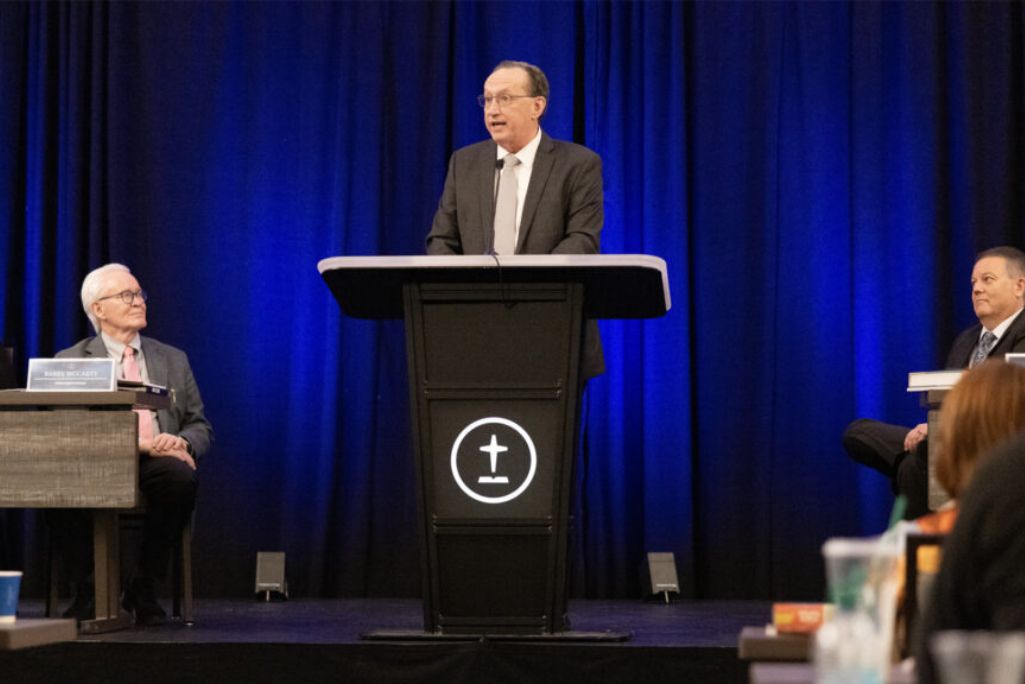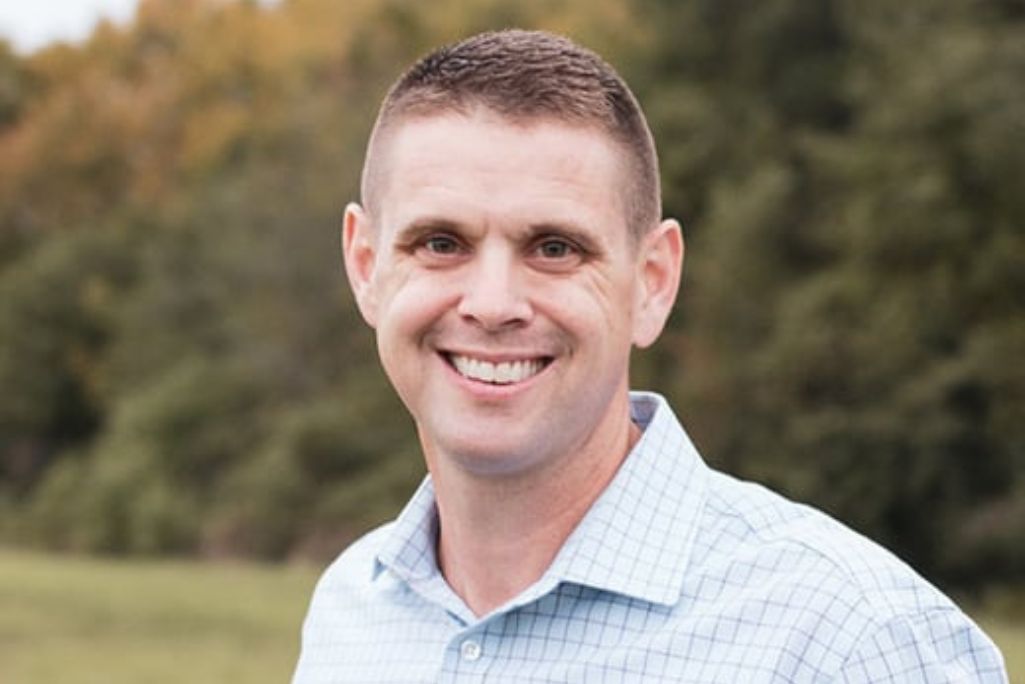
SBC Executive Committee President Jeff Iorg speaks to the Executive Committee on Monday night, Feb. 17, in Nashville.
NASHVILLE (BP) — In a landmark address to Southern Baptist Convention (SBC) Executive Committee (EC) members, SBC EC President Jeff Iorg outlined plans for continued sexual abuse prevention and response, presented findings from the SBC’s sexual abuse hotline that clarify the incidents of abuse in Southern Baptist churches and shared steps for responding to calls for greater financial clarity from SBC entities.
His comments came Monday evening in the Executive Committee’s first plenary session of its February meeting at the Hilton BNA Nashville Airport and 11 months after Iorg was elected to the role in a special-called meeting.
Iorg told trustees he intended to address three issues of “general interest” for Southern Baptists.
Sexual abuse reform
Jeff Dalrymple, new director of sexual abuse prevention and response, is focusing on six initiatives to be finalized before the annual meeting, Iorg said, with additional plans forthcoming.
Those initiatives are:
- Enhancing the free Essentials curriculum for all Southern Baptist churches.
- Appointing an advisory committee on sexual abuse prevention and response strategies.
- The EC’s assuming control and responsibility of sbcabuseprevention.com.
- Improving the SBC abuse hotline.
- Formalizing a network of state convention abuse prevention and response leaders.
- Hosting “Safeguarding the Next Generation” — a training event to take place at the annual meeting in Dallas.
“In all of these things the Executive Committee is taking measured, intentional, proactive steps toward establishing sexual abuse prevention and response as a ministry responsibility,” Iorg said.
Those steps build upon work by groups such as the Abuse Reform Implementation Task Force (ARITF) and the creation of the Essentials curriculum. Input from Southern Baptists, such as those who will serve on the advisory committee and Baptist state conventions that will work directly with churches, will continue to be crucial, Iorg said.
Hotline results — seven churches
Iorg shared statistics discovered through the May 2022 establishment of a hotline to report cases of sexual abuse. Though not the only data source, it is the primary one providing independently-verified information.
Since its launch, the hotline has received 1,008 contacts. One-third (334) of those were requests for information, opinions or spam. The rest of the contacts reported alleged abuse.
Of those reporting abuse, 68% were among Southern Baptists. From that group, 41% were incidents among adults and 59% between an adult and a minor.
Notably, Iorg said, more than half (51%) of the contacts came within the first four months of the hotline’s opening. The other 24 months — from January 2023 through December 2024 — the hotline averaged 13 contacts a month. When the percentages from the first four months are applied to those more recent figures, it points to about four people requesting information and nine reporting alleged cases of abuse per month. Of those nine, two would likely not be Southern Baptist churches.
The 24-month period of 2023 and 2024 saw 128 cases — just over five per month — referred to the SBC Credentials Committee for it to consider whether a church was in friendly cooperation with the SBC.
The process has resulted in seven churches being declared not in friendly cooperation and removed from the SBC based on their responses related to sexual abuse, he said.
“When we look past the surge at the beginning and isolate the data over the last 24 months,” Iorg said, “it provides a better picture of the ongoing reporting we are receiving.”
The process reveals two broad conclusions, he maintained, while stressing that even one case of abuse is one too many.
“First, sexual abuse is a serious and real problem. And when it happens, it is devastating for the survivors, the church, the community and every person who is involved,” Iorg said. “Survivor stories, particularly, are gut-wrenching and … every church must make every reasonable effort to prevent sexual abuse and respond proactively when it happens.”
The second speaks to alleged complacency or even cover ups among SBC leadership.
“Abuse is not frequently being reported in Southern Baptist churches,” Iorg told trustees. “We have widely publicized this issue for the past five years and encouraged people to come forward with information and allegations. We now have verified, third-party data.”
Because of this, he said, “we reject the false narrative Southern Baptist churches are dangerous places for children. That Southern Baptists are protecting predators. And that Southern Baptists are uncaring in responding to survivors.”
He added how, “with seven rare exceptions” among 47,000, Southern Baptist churches “are cooperating to prevent abuse and address these [abuse] allegations.”
Rewritten business and financial plan to address referrals
Iorg acknowledged several referrals at various annual meetings in recent years asking for greater financial transparency by entities. EC leadership, in consultation with other entity leaders, determined the best way to address those concerns was through revising the SBC Business and Financial Plan.
The plan, he explained, outlines general expectations of how entities and the Executive Committee are to operate. A process lasting several months included input from EC staff and officers, entity presidents, entity chief financial officers, entity attorneys, EC attorneys and EC members to produce five goals to create the document.
They are:
- Southern Baptists govern their entities by electing trustees who are expected to fulfill the business and financial plan.
- The plan must emerge from the SBC Constitution and Bylaws.
- The plan must focus on general principles rather than specific methodologies.
- The plan must call for transparency by entities in business and financial decisions.
- The plan must use plain language, with technical or legal jargon appearing only where necessary for clarity.
Iorg pointed to what he called annual meeting messengers’ greatest responsibility.
“The most important role of messengers is to elect trustees — people they trust — to do the hard work of governing the entities,” he said.
Iorg referred to the original SBC Constitution’s mandate regarding the appointment of “managers” by messengers to “boards,” i.e., trustees over entities, in current terms. Governing them is not designed to take place via pressure applied online or by media, nor even directly by the messengers themselves. The trustee system is also “far superior to the alternative of attempting to run a multi-billion-dollar enterprise on motions, short debates and rushed votes.”
The arrangement doesn’t diminish Southern Baptists’ voices when it comes to entities, though, he said.
“Another important role of messengers is surfacing ideas worth considering, which are then referred to appropriate boards of trustees for consideration,” Iorg said. “Any resulting actions can then be taken after reflective deliberation and careful decision-making.”
The plan’s connection to the SBC Constitution and Bylaws dictates that some business practices, like revealing proprietary information, cannot be adopted by entities if they conflict with their legal responsibilities. On that note, the plan includes 15 instances where each entity’s board must report their actions, including Cooperative Program (CP) promotion, presidential compensation, staff compensation and executive expenses.
The recommendation for the plan will come from the Committee on Convention Finances and Stewardship Development on Tuesday (Feb. 18). If it is approved, messengers will vote on it at the 2025 SBC annual meeting in Dallas.
$3 million earmarked toward potential legal costs
Funding potential legal costs was one of the more controversial aspects of sexual abuse reforms when messengers voted for them in 2021. “Potential” has long since been replaced by “actual.”
Messengers at that meeting voted for an independent, third-party investigation of the SBC EC’s handling of sexual abuse claims. The Executive Committee was instructed to surrender attorney/client privilege related to the investigation. The motion called for the investigation and its aftermath to be paid for with CP funds. The Executive Committee also ultimately indemnified Guidepost Solutions, which conducted the investigation.
As a result, $13 million in EC financial reserves through December 2024 has gone toward legal bills. For the current fiscal year, Iorg told trustees, the Executive Committee is working to secure a $3 million loan to meet financial obligations.
A “good faith effort” was made by the Executive Committee early on to avoid using Cooperative Program funds for legal costs by paying out of reserves, Iorg said. That is no longer an option.
“Decisions were made by the messengers in 2021. Those decisions have consequences. Those consequences have costs. And those bills must be paid,” he said.
The expected legal tab for the upcoming year comes to approximately $3 million, he shared. Auditors have “rightly insisted” presenting “a viable funding plan to avoid serious auditing and legal repercussions.”
Though the SBC building in downtown Nashville is for sale, using the proceeds from its sale is not an immediate option, he added, due to the unstable timing of real estate. That is why the EC is recommending a $190 million national Cooperative Program budget for 2025-26 with a $3 million priority allocation for legal expenses.
Iorg acknowledged the announcement as “a controversial and difficult recommendation to make. No mission-centered Southern Baptist wants to take this action. I don’t. You don’t. None of us do.”
For pastors who may consider redirecting CP gifts, Iorg delivered some points to consider.
Paying legal bills with CP funds is not new. All SBC entities and state conventions retain attorneys and law firms. “We have always paid and we will continue to pay indefinitely into the future legal costs of doing business in this culture, and those payments will be made from Cooperative Program funds,” he said.
In addition, the ethical dilemma isn’t about where the funds come from, but paying debts. Messengers who made the decision that led to this point may not have been aware of unintended financial consequences, he pointed out. Most Southern Baptists were not in the room in 2021 when the vote passed.
The truth remains, he said, that “the resulting bills must now be paid.”
He went on to point out that the legal costs are going to defend the SBC, not for punitive reasons. Also, for comparison’s sake, Iorg noted that more than $10 billion is expected to be given in Southern Baptist churches in 2025.
A ‘resolute focus’
“Southern Baptist pastors do not run from trouble. They walk toward it,” Iorg said. “They specialize in holding steady in messy situations — especially those caused by the choices of others.”
The convention has faced financial challenges before, he added, such as both mission boards experiencing embezzlement in the 1920s that surpassed $18 million in today’s dollars.
Just like then, the SBC is more than capable of unwavering attention to the gospel.
“I am still being asked if we can push through this challenge and return to a more resolute focus on our eternal mission,” Iorg said.
His response: “An unequivocal yes.”
Just over a year ago, Iorg was preparing for retirement. Standing before the EC as its president Monday night, addressing these issues and responding to SBC critics — including those who are Southern Baptist — was nowhere near the plan, he said.
His devotion to the role is fueled by seeing the work of Southern Baptists through churches, colleges, hospitals, camps, Vacation Bible Schools and the largest missionary-sending force and domestic church-planting movement in the United States, to name a few.
“My friends, I said it last time [and] I’ll say it again tonight,” Iorg said, “Southern Baptists are still a force for good.
“Critics claiming the SBC should be dismantled are wrong,” he added.
“I signed on to guide us through these current challenges,” he said. “… My hope is the leaders in this room, thousands of pastors who will hear this speech and millions of Southern Baptists will resolve to go through this together.”
(EDITOR’S NOTE — Scott Barkley is chief national correspondent for Baptist Press.)


